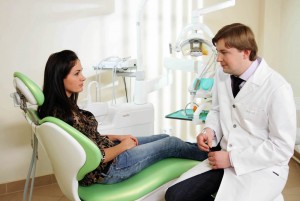Dental implants and pregnancy planning

Today, dental implants are becoming an increasingly popular procedure.
Responsible women know that before becoming pregnant, it is necessary to carry out a complete sanitation of the oral cavity: to eliminate problems with the gums, to cure tooth decay.
It often happens that teeth that cannot be cured have to be removed.
And then the question arises: is dental implantation possible during pregnancy? Or is it necessary to delay implantation before the birth of the baby?
It also happens that a woman wants to restore lost teeth before pregnancy.
However, not everything is so simple, because implantation is a rather serious surgical intervention that requires a long rehabilitation period.
Therefore, first of all, it is necessary to prioritize: to postpone the installation of implants for the period after childbirth, which can be from one and a half to two years or delay the moment of conception.
Implantation and pregnancy are completely incompatible things.
During pregnancy, any surgical intervention is undesirable. Therefore, it is better to solve all problems with teeth before conception.
Why install implants before pregnancy
The question arises, why are dental implants and pregnancy planning incompatible?
The installation of implants must be done before pregnancy for the following reasons:

- Implant implantation is a surgical operation that requires careful preparation.
- During pregnancy, immunity is weakened. During this period, it is easier to catch any infectious disease. Restoring the body takes a longer time.
- Any serious intervention is stress, which is very harmful to pregnant women.
- The preparatory stage for the operation includes such examinations, which are undesirable during pregnancy. If examinations such as blood donation in no way affect the health status of pregnant women, then an X-ray examination is strictly prohibited.
- The operation is performed under general anesthesia, the use of which is also highly undesirable.
- In the postoperative period, anti-inflammatory and analgesic therapy is required. As a rule, many drugs are prohibited during pregnancy.
- In the process of implant engraftment, complications often arise, the treatment of which requires additional treatment.
Why pregnant women should not be implanted
If the date of implant placement is already set, and the woman finds out that she is pregnant, the operation must be canceled.
If you install implants in the first trimester of pregnancy, then due to the fact that vital organs are laid during this period, the operation can not only negatively affect the development of the embryo, but also provoke a miscarriage.
What to do if the implant is already installed
If pregnancy has occurred during the period of osseointegration, then nothing can be changed here. Moreover, the implants are already installed, and the installation of the abutment and prosthetics are not dangerous and painful procedures. They can not cause much harm to either the fetus or the expectant mother.
Nevertheless, during this period it is necessary to pay increased attention to the state of health, and any dental procedures should be carried out with the permission of the gynecologist.
If the doctor recommends delaying the completion of implantation, follow his advice. In case of successful osseointegration, performing prosthetics is never too late.
If during the period of osseointegration it was possible to conceive a child, then this indicates a successful engraftment of the implant.
Why is postponing implantation postponed?

After childbirth, the female body is very weakened. It takes an average of one year to fully restore the body.
In this regard, it is undesirable to expose the body to stress.
A contraindication to implantation is the lactation period. It is forbidden to take medications during breastfeeding.
If the baby is breast-fed, then you can install implants.
The effect of pregnancy on established implants
The only problem is any signs of infection associated with dental implants.
Therefore, it is recommended to visit the dentist twice a trimester to examine dental structures and the oral cavity, in order to timely identify foci of infection.